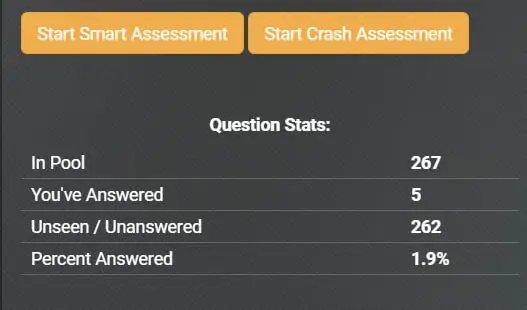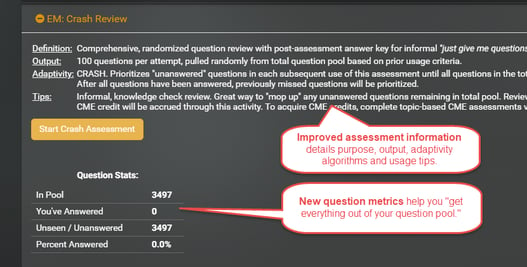We offer two different types of assessments so you can choose the prep modality that's the best fit for your learning objectives.
Begin by logging into your Med-Challenger account. When you expand qualifying dynamic exams (Simulations and Chapter Exams), you’ll see two buttons:
“Start Smart Assessment” and “Start Crash Assessment”

These give you two different approaches to knowledge review.
Smart Assessments
If you choose “Smart” Assessments, any previously missed questions are reintegrated along with any unseen, unanswered questions in subsequent attempts of the same assessment.
Because Smart Assessments use adaptive intelligence to focus on strengthening your weakest areas, Smart Assessments provide the best route to mastery of all content through repeated use of the respective Smart Assessment.
However, “reintegrated questions” – no matter how timely, appropriate, or beneficial for content mastery and retention – may not be preferred by users who want to go through ALL unanswered questions without any “recommended repeats” as a more informal knowledge review.
That’s where Crash Assessments come in.
Crash Assessments
Crash Assessments let users simply “crash” through all the questions in the total pool – randomly – without any strategic repetition of missed questions.
Crash Assessments WILL NOT issue previously answered questions before all questions are seen and answered - right or wrong - at least once. In fact, if you have answered a specific question anywhere – through a board exam simulation, a chapter exam, a CME topic quiz, etc. – the Crash Assessment will know.
Only after all questions have been answered once will previously missed questions in the total question pool start to be re-served in subsequent attempts of that specific assessment.
Crash Assessments are a great tool to “mop up” any unseen or unanswered Q&A left in a question pool after other review activities have been used.
Question Usage
Global question usage metrics that tell you how many total questions a selected asset or assessment contains – and how many of the questions in the pool have been seen-and-answered.

